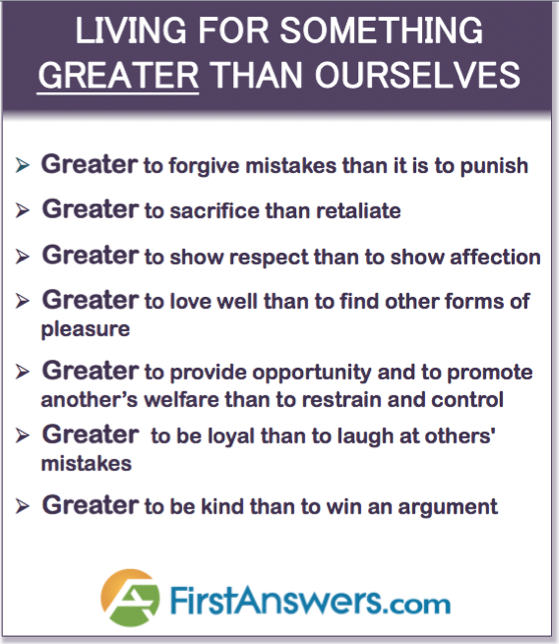Happy Marriage Buttons–Live for Something Greater Than Ourselves
Excerpts from FirstAnswers.com online course: How to Increase Love and Happiness

Suppose there were love and happiness buttons in every brain that were instinctive and a natural part of life. Whenever we pushed them, we felt a surge of pleasure, fulfillment, and happiness. Would you want to know what these buttons are and where to find them? Absolutely. While there may not be buttons, there are some natural conditions within us that respond with pleasure whenever linked to certain types of thoughts and actions. This means that as we grope along in the dimly-lit halls of life, we might accidentally do something and discover a surge of satisfaction. These discoveries can then be used as "Happy Marriage" buttons–pressed, or enacted, when we wish to create more love in marriage and life. When it comes to dealing with common marital or blended family issues, or we simply want to create and feel more love in life, knowing what buttons to push to create more love and happiness can be an invaluable to tool.
Like after eating chocolate for the first time, we want to try it again and again. If we do, we will discover one of these love and happiness “buttons” that can be triggered again and again. In the case of marriage, one of these buttons includes the sexual urgings and love map that make us attractive and determine who we find attractive. Another is the delight in finding someone interesting who seems to like us. Others include the affection, intense attention, and natural satisfaction and stimulation that come with companionship. While these are familiar to most, there is one more that is often overlooked–and one of the more powerful buttons in marriage.
LIVING FOR SOMETHING GREATER
We find one of these brain buttons when we discover that living for something greater than ourselves is accompanied by a deep sense of satisfaction that selfishness and self centeredness cannot bring. In a world filled with individualism, where we examine everything in terms of its measure for ourselves alone, many are finding that an intense focus on individual fulfillment limits love and happiness. Rollo May, an American philosopher, wrote about “The New Puritanism,” explaining that in a former time, people had little sex but great passion. Nowadays, many satiate themselves with sex in the pursuit of love, which results in less passion and happiness.
In contrast, those who find the greatest love and fulfillment do so paradoxically by giving of themselves, even sacrificing, for something or some purpose greater than self-fulfillment. The forms this can take are worth real consideration.
It is not necessary to be dramatic or sensational to live for something greater than yourselves. It can simply be a joint commitment to teach and rear your children, serve in church or community programs, care about and respect standards and ideals, and be good neighbors. You do it when you sacrifice for education, care for elderly parents, or offer your talents and abilities to a charitable organization. These can be the happiest times of your lives. You can look back on them as worthwhile experiences rich in feeling.
Imagine searching for these kinds of things to give your efforts to rather than having to worry about what your partner is or is not doing for you. When two people care for each other and together work toward shared goals, they are tapping into a powerful source of happiness. Instead of overlooking this, people should treat it with the importance it deserves and measure anyone they hope to marry by his or her ability to join in this effort. Linking combined energy toward mutual goals gives added meaning and excitement. When one or both partners act to demonstrate commitment to their goals, shown by the willingness to adjust themselves, the result is almost always a multiplication of love.
shared goals, they are tapping into a powerful source of happiness. Instead of overlooking this, people should treat it with the importance it deserves and measure anyone they hope to marry by his or her ability to join in this effort. Linking combined energy toward mutual goals gives added meaning and excitement. When one or both partners act to demonstrate commitment to their goals, shown by the willingness to adjust themselves, the result is almost always a multiplication of love.
In numerous smaller ways, this principle also brings its rewards. It is greater, for instance, to forgive mistakes than it is to punish. When needed, it is greater to sacrifice than retaliate. It is greater to show respect than to show affection. It is greater to love well than to find other forms of pleasure. It is greater to provide opportunity and to promote another welfare than to restrain and control. Loyalty is greater than laughing at others' mistakes. Kindness is greater than winning an argument.
CHANGE CREATES LOVE & HAPPINESS
To understand why planning for change is a cause of love and happiness, imagine a young child who learns something new. It could be a physical skill in dance or sports or learning to ride a bike, something learned in school, or a better way to behave. Whenever new growth happens, it is accompanied by joy. The child is happy with his or her new-found competence and usually wants others to know about it or wishes to ride his bike everyday, nonstop.
Becoming more organized, cooking and cleaning, getting better at child management, improving communication abilities, and many other changes happen in order to make a marriage succeed. When they happen, you can find personal pleasure in them, and you might like to show them off a little. It is also a source of happiness to discover that your partner appreciates what you have learned and displays that appreciation.
PROBLEMS SHOW US WHAT TO IMPROVE
Marriage offers more love and happiness than you can imagine, but only the naive or foolish expect there to be only rewards and no problems. Blended families view marriage as a rewarding new beginning filled with hope–which it can be–but ask anyone in this position what blended family stress they feel as they learn to juggle marriage and new families issues. It is better if you anticipate the possibility of both–rewards and problems. Given the fact that both are possible, you can enhance your own happiness by training yourself to look for and find what is rewarding and using problems to help you grow. After all, rather than existing as evidence of failure, most problems simply mean that something needs to improve. They signal a need for positive growth as accurately as they reflect a lack of skill or indifference.
When you commit to finding the sources of love and happiness, you discover that some of the things you thought were problems either go away by themselves, or through the lack of attention, or they just seem to now matter less. The choice of how to perceive your marriage is yours. If you choose to look for and find the reward "buttons," you are choosing a path that brings happiness to you and your spouse.
 RSS Feed
RSS Feed